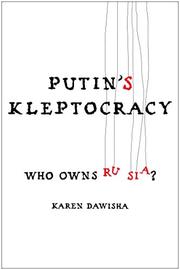
A new database compiled by the Anti-Corruption Data Collective reveals that several post-Soviet oligarchs connected to interference efforts have donated between $372 million and $435 million to more than 200 of the most prestigious non-profit institutions in the U.S. over the past two decades, notes a new analysis.
The list of recipients covers the gauntlet: from prestigious think tanks like the Brookings Institution and the Council on Foreign Relations, to world-renowned universities such as Harvard and the University of Southern California, to cultural icons such as the New York’s Museum of Modern Art (MOMA) and the Kennedy Center in Washington D.C., according to former NED Penn Kemble fellow David Szakonyi, an assistant professor of political science at George Washington University, and Casey Michel, an investigative reporter based in New York.
Taken together, the staggering donations we managed to compile, which come from either the oligarchs directly or via the companies or foundations they run, raise significant questions about how U.S. organizations scrutinize money they receive. The gifts also highlight the urgent need for changes in the ways these institutions oversee such donations—and the ways the U.S. government oversees such institutions, they write for Foreign Policy:
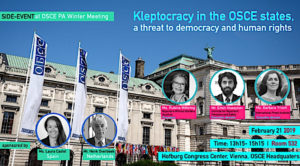 The most obvious question is: Why exactly do these oligarchs bankroll think tanks, universities, cultural centers, and religious groups? Unlike kleptocratic networks that stash their cash in assets such as real estate, hedge funds, and anonymous shell companies, there’s no possibility of money laundering through philanthropic donations. Rather, the gifts appear to follow two specific threads:
The most obvious question is: Why exactly do these oligarchs bankroll think tanks, universities, cultural centers, and religious groups? Unlike kleptocratic networks that stash their cash in assets such as real estate, hedge funds, and anonymous shell companies, there’s no possibility of money laundering through philanthropic donations. Rather, the gifts appear to follow two specific threads:
- On the one hand, donating to institutions such as think tanks may be about establishing a potential toehold over policy decisions in Washington. Indeed, such considerations have helped spark recent calls for greater transparency within American think tank funding, with many failing to disclose details about their substantial donations received. ….
- The second primary reasoning behind such donations relates to so-called reputation laundering. Broadly speaking, reputation laundering refers to donors positioning themselves as philanthropists, obscuring links to prior business practices and relations with sanctioned oligarchs or kleptocratic regimes. That is, oligarchs use these donations—and the willingness of institutions to accept the funds without any pushback—to soften and whitewash their own personal images. Reputation laundering can also extend to national governments as well. For instance, some of the gifts in the database appear to be in the pursuit of softening Russia’s image abroad.
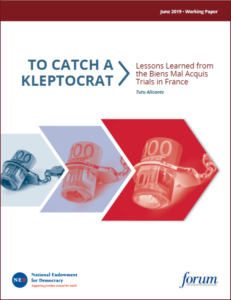 More transparency is needed, ideally through a centralized, publicly accessible database with information on donors and donations, add Szakonyi and Michell. A forthcoming paper from the National Endowment for Democracy regarding oligarchic funding for American and British universities recommends a “comprehensive, searchable list of all donations (foreign and domestic) over a modest threshold,” as well as “the identity of donor, amount and major stipulations.”
More transparency is needed, ideally through a centralized, publicly accessible database with information on donors and donations, add Szakonyi and Michell. A forthcoming paper from the National Endowment for Democracy regarding oligarchic funding for American and British universities recommends a “comprehensive, searchable list of all donations (foreign and domestic) over a modest threshold,” as well as “the identity of donor, amount and major stipulations.”
“Investigative journalists uncovering financial crime and corruption are being subject to a significant amount of risks and threats, which has a chilling effect on their ability to continue to bring crucial matters of public interest to light,” say the authors of Unsafe for Scrutiny: Examining the pressures faced by journalists uncovering financial crime and corruption around the world.
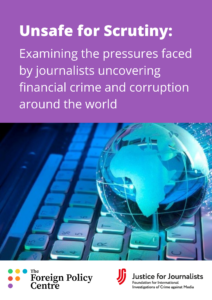 “Particularly alarming is the level and frequency of legal threats being sent to journalists all over the world. The UK is the highest international source of these legal challenges – almost as high as EU countries and the US combined – which points to a clear need for further review to prevent potential vexatious misuse of the UK legal system,” says Susan Coughtrie, Project Director at the Foreign Policy Centre.
“Particularly alarming is the level and frequency of legal threats being sent to journalists all over the world. The UK is the highest international source of these legal challenges – almost as high as EU countries and the US combined – which points to a clear need for further review to prevent potential vexatious misuse of the UK legal system,” says Susan Coughtrie, Project Director at the Foreign Policy Centre.
Key findings:
- The majority (71%) of respondents reported experiencing threats and/or harassment while working on investigations into financial crime and corruption.
- Of those, almost all had been subject to verbal threats (81%), trolling on social media (79%) and written threats (70%).
- Civil legal cases, especially the use of cease and desist letters, surveillance, both on and offline, interrogation by authorities and smear campaigns, were also experienced by more than 50% of these respondents.
- Incidences of threats or harassment with that have notable psychological impact – such as trolling, verbal and written threats, smear campaigns, and blackmail – were the most highly reported (35% of all incidences reported).
- Legal threats were strongly highlighted by survey respondents as an area of particular concern. 73% of all respondents experiencing threats had received communication(s) threatening legal action as a result of information they had published. The United Kingdom (UK) was by far the most frequent country of origin for legal threats, other than the journalists’ home countries. The UK was almost as frequently a source of these legal threats as the European Union (EU) countries and the United States combined Defamation pursued as a civil case was by far the most frequently given reason behind legal communication(s) to respondents (91%).
- At least 61% of respondents also reported their investigations had uncovered a link (directly or indirectly) with UK financial and legal jurisdictions.
- The resources that respondents identified as the most valuable while reporting on financial crime and corruption also overlapped with those they identified as the most lacking, namely legal aid and counsel, financial support and whistleblower protections.
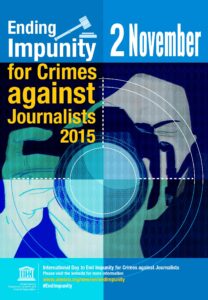 The report, based on a recent survey designed to uncover the risks and threats facing investigative journalists targeted for uncovering financial crime and corruption, was supported by the Organized Crime and Corruption Reporting Project (OCCRP), the International Consortium of Investigative Journalists (ICIJ) and the Global Investigative Journalism Network (GIJN).
The report, based on a recent survey designed to uncover the risks and threats facing investigative journalists targeted for uncovering financial crime and corruption, was supported by the Organized Crime and Corruption Reporting Project (OCCRP), the International Consortium of Investigative Journalists (ICIJ) and the Global Investigative Journalism Network (GIJN).
The report was launched with a webinar on Monday 2nd November, the International Day to End Impunity for Crimes Against Journalists, with the following speakers: Paul Radu (investigative journalist and co-founder of OCCRP), Oliver Bullough (UK journalist and author of Moneyland), Sarah Clarke (Head of Europe and Central Asia at ARTICLE 19) and Susan Coughtrie (Project Director at the Foreign Policy Centre).







